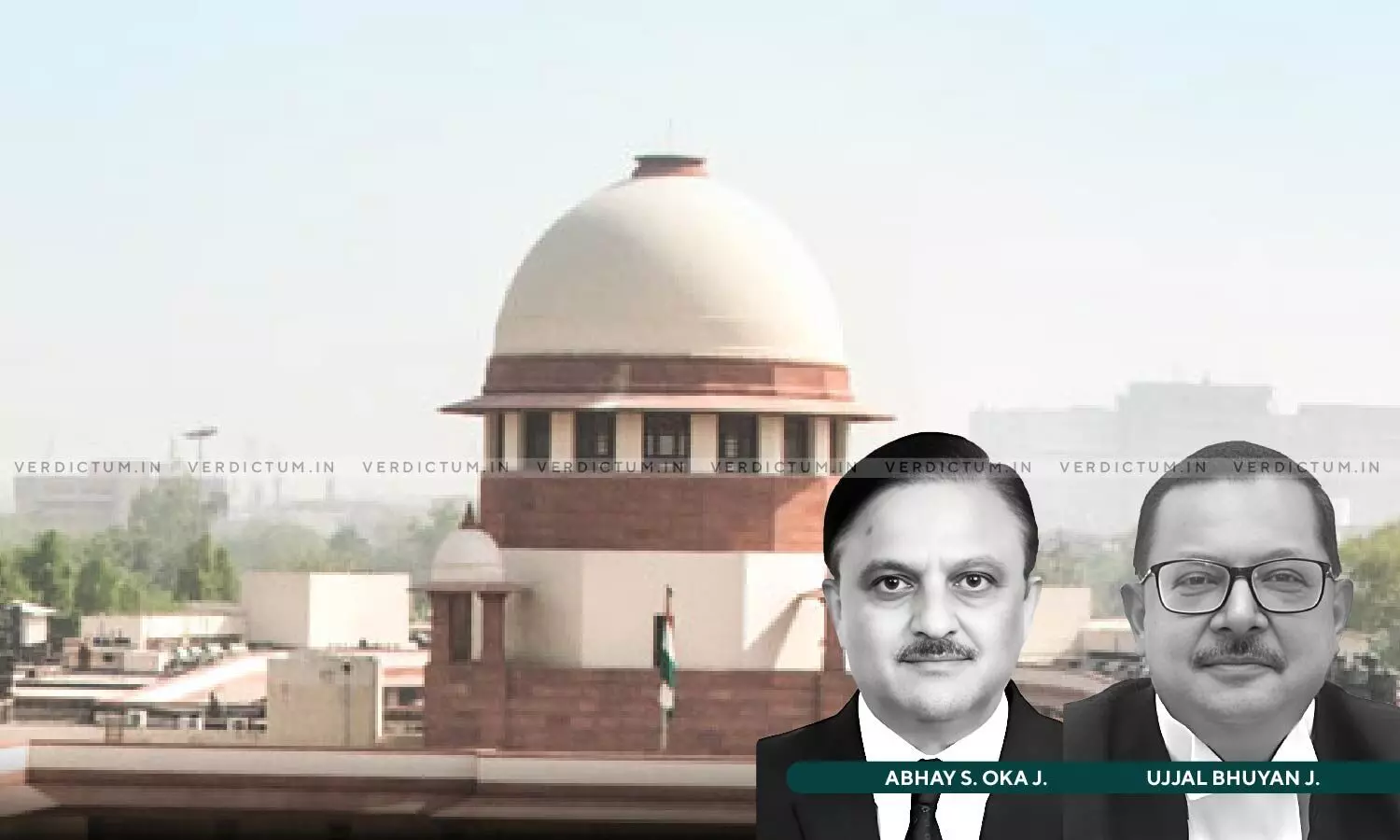
Justice Abhay S. Oka, Justice Ujjal Bhuyan, Supreme Court
Cases Of Those Litigants Having No Regard For Truth & Suppressing Material Facts Need To Be ‘Thrown Out’ Of Court: Supreme Court
 |
|The Supreme Court allowed a Criminal Appeal of an accused in a cheque dishonourment case, pending before the Judicial Magistrate First Class (JMFC).
The Supreme Court remarked that the cases of those litigants who have no regard for the truth and those who indulge in suppressing material facts need to be ‘thrown out’ of the Court.
The Court remarked thus in a Criminal Appeal filed by an accused in a cheque dishonourment case, pending before the Judicial Magistrate First Class (JMFC).
The two-Judge Bench comprising Justice Abhay S. Oka and Justice Ujjal Bhuyan observed, “It is settled law that a litigant who, while filing proceedings in the court, suppresses material facts or makes a false statement, cannot seek justice from the court. The facts suppressed must be material and relevant to the controversy, which may have a bearing on the decision making. Cases of those litigants who have no regard for the truth and those who indulge in suppressing material facts need to be thrown out of the court.”
AOR Sachin Patil represented the Appellant/Accused while AOR Vaibhav Yeshwant Kulkarni represented the Respondent/Complainant.
Brief Facts
A Complaint was filed by the Respondent, a Credit Co-Operative Society before the JMFC, alleging the commission of an offence punishable under Section 138 of the Negotiable Instruments Act, 1881 (NI Act) on the basis of the dishonour of a cheque, which was allegedly issued by the Appellant-accused in favour of the Respondent. It was alleged by the Respondent that the Appellant had obtained a loan of Rs. 3,50,000/- from the Respondent in July 2006 through an overdraft facility. At the time of obtaining the loan, she issued two security cheques and allegedly, due to a default in repayment, the Respondent deposited the first cheque drawn in February 2007 for the amount of Rs. 3,75,976/-, which was dishonoured. Following a legal demand notice from the Respondent’s Advocate, a criminal case was filed under Section 138 of NI Act in April 2007. The Appellant paid the cheque amount before the JMFC in September 2016, following which the Respondent withdrew the prosecution and the Appellant was acquitted.
In the interregnum, the Appellant was allegedly granted another loan of Rs. 11,97,000/- in July 2007 by the Respondent and due to an alleged default in repayment of the loan amount and interest accrued thereon, the Respondent deposited the second cheque drawn in October 2016 for the amount of Rs. 27,27,460/-, which was dishonoured. The Respondent issued a legal notice and while disputing the case made out in the demand notice, through her Advocate’s reply, the Appellant sought the supply of the loan documents from the Respondent to enable her to give a reply to the statutory notice. By writing another letter through her Advocate, she informed the Respondent’s Advocate that the documents had not been supplied to her. The Respondent filed a Complaint and the JMFC issued the process in March 2017. Challenging this, the Appellant filed a Writ Petition before the Bombay High Court, which was dismissed and being aggrieved, the Appellant approached the Apex Court.
Contentions
The counsel for the Appellant submitted that she had already paid the first loan of Rs. 3,88,077/- in March 2007, and the said loan account was subsequently closed; yet, the Respondent chose to prosecute her wrongly and was forced to repay the entire loan again as she did not have the loan statement then and could not prove her earlier payment. On the other hand, the counsel for the Respondent contended that the Complaint contained all the essential ingredients and that there was no suppression of material facts warranting its dismissal.
Reasoning
The Supreme Court in view of the above facts, noted, “It was the respondent's duty to supply documents to the appellant or her advocate to enable the appellant to properly reply to the demand notice. At least, the inspection of documents could have been provided to the appellant. After noticing the fact that notwithstanding service of two letters written by the appellant, relied upon documents were not provided to the appellant, the learned Magistrate could have dismissed the complaint by exercising power under Section 203 of CrPC, as the appellant could not have replied to the statutory notice without looking at the documents relied upon.”
The Court said that this was a case where very material documents in the form of two letters addressed by the Appellant were suppressed in the Complaint and the statement on oath under Section 200 of the Criminal Procedure Code (CrPC). It added that in the statement on oath, the Respondent-Complainant vaguely referred to a “false notice reply”, but a copy of the reply was not produced by the Respondent along with the Complaint.
“While filing a complaint under Section 200 of CrPC and recording his statement on oath in support of the complaint, as the complainant suppresses material facts and documents, he cannot be allowed to set criminal law in motion based on the complaint. Setting criminal law in motion by suppressing material facts and documents is nothing but an abuse of the process of law”, it further observed.
The Court concluded that the High Court ought to have interfered and quashed the Complaint. It also clarified that the other remedies of the Respondent to file proceedings for recovery of the amount allegedly due and payable by the Appellant in accordance with law will remain open.
Accordingly, the Apex Court allowed the Appeal, set aside the impugned High Court’s Order, and quashed the Complaint pending before JMFC.
Cause Title- Rekha Sharad Ushir v. Saptashrungi Mahila Nagari Sahkari Patsansta Ltd. (Neutral Citation: 2025 INSC 399)
Appearance:
Appellant: AOR Sachin Patil, Advocates Sachin Jaysing Patil, Geo Joseph, Risvi Muhammed, and Rishabh Agarwal.
Respondent: AOR Vaibhav Yeshwant Kulkarni, Advocates Abhay Anil Anturkar, Disha Rathod, Prathamesh Deshpande, Yash Agarwal, and Dhruv Tank.